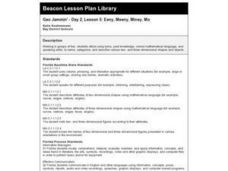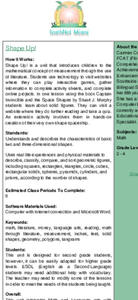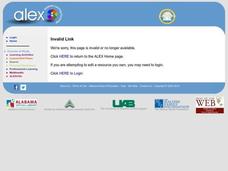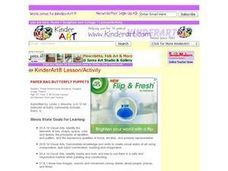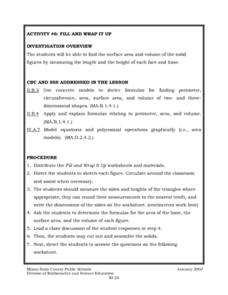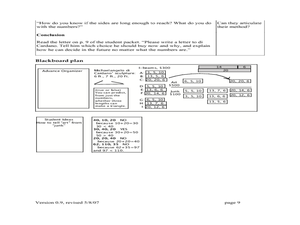Curated OER
Comparing Measurements
Students explore measurements by completing worksheets in class. In this geometry lesson plan, students identify the basic measurement units in both the English and metric systems. Students analyze 2 and 3 dimensional objects and...
Curated OER
Spaces and Places
Students identify three-dimensional forms in various buildings and construct three-dimensional paper forms.
Curated OER
Solid Shapes
In this solid shapes worksheet, students learn to identify and solve word problems that use solid shapes. Students solve six word problems about solid shapes.
AIMS Education Foundation
Shifty Shapes
Shape shifters examine and experiment with pattern shapes. In this geometry lesson, they work in groups to name and describe pattern block shapes, and they discover the combinations of shapes that can be placed inside a hexagon.
Curated OER
Color in 3-D: A Nature Design Project
Students view a film about Hans Hofman and consider his use of color and layering. They experiment with the concept of 'push and pull' by using warm and cool color schemes in a tracing of leaves and shapes. Students view their work using...
Curated OER
Geo Jammin' - Day 2, Lesson 5: Eeny, Meeny, Miney, Mo
Students, in groups, use song lyrics and math to descrie two and three dimensional shapes.
Curated OER
Geometry Journal: Classifying Solids
In this geometry worksheet, 10th graders respond to journal prompts related to prisms and classifying solid shapes. The two page worksheet contains nine questions. Answers are included.
Curated OER
What a SHAPEly Fit!
Students identify and explore the attributes of polygons. They design and create a quilt square using polygons, and produce a class quilt.
Curated OER
Shape Up!
Students investigate measurement through the use of literature through this series of lessons.
Curated OER
Measurement: 2D and 3D
Students solve volume problems. In this geometry lesson, the class watches a video about clean water (link provided) and individuals compare the volume of different prisms, including an actual drinking glass. Extension activities include...
Arizona Department of Education
Area and Perimeter of Regular and Irregular Polygons
Extend young mathematicians' understanding of area with a geometry lesson on trapezoids. Building on their prior knowledge of rectangles and triangles, students learn how to calculate the area of trapezoids and other irregular...
Alabama Learning Exchange
Twisted Tangrams
Primary geometers create a picture using tangrams. In this geometry instructional activity, students read Grandfather Tang: A Tale Told with Tangrams, cut out their own tangrams, and choose a character from the story to make using their...
Utah Education Network (UEN)
Create, Classify, and Sort Quadrilaterals
Quadrilaterals can be quirky! Fourth graders use geoboards and bands to create four-sided figures. They analyze the attributes such as angle size and presence of parallel sides. As a result they learn to differentiate among rectangles,...
Alabama Learning Exchange
Understanding Fractions
Young learners explore fractions and demonstrate parts of a whole by using a candy bar and a piece of paper and dividing both into equal parts. Included is a worksheet that requires youngsters to color in half of each polygon shape. Some...
Curated OER
Dihedral Figures
Middle and high schoolers perform transformations. In this web based lesson, students explore dihedral figures. They use the web tools to translate, rotate, and reflect figures. Pupils identify lines of symmetry.
Curated OER
Paper Bag Butterfly Puppets
Whether you're using it to tell stories, explore the letter b, or during a life science lesson, these butterfly puppets will be a hit. Youngsters use crayons, tissue paper, and paper bags to create butterfly puppets.
K-5 Math Teaching Resources
Dot Paper
In need of some dot paper for your next geometry lesson? Then look no further. This simple template allows you to maintain a classroom supply of this special paper for whenever the need arises.
Curated OER
A Rectangular Prism and Its Net
Identify the nets for prisms and other geometric shapes. Learners calculate the surface area of the rectangular prism then sketch the shapes of prisms and other polygons. Unfolded cereal boxes are used as a visual aid, great idea!
Curated OER
Ruler and Compass Constructions
Fourth and fifth graders examine how to construct perpendicular lines and to bisect angles using rulers and compasses in this unit of lessons. They design a number of polygons using these methods.
Curated OER
Finding Polygons in Cubist Art
Fourth graders explore geometric properties and relationships in a two-dimensional work of art. They first search for and identify polygons in a Cubist painting and then use polygons to create their own Cubist portrait of a classmate.
Futures Channel
Folding Circles
Students investigate properties of circles. For this geometry lesson, students differentiate between similarity and congruence as they observe polygons. They investigate properties of two and three dimensional shape.
Curated OER
Cap-It to the Max
Eighth graders compare the volume of three cylinders constructed from the same size sheet of paper. They use concrete and graphical models to derive formulas for finding perimeter, circumference, area, and volume of two and three...
Curated OER
Fill and Wrap It Up
Students find the surface area and volume of the solid figures by measuring the length and the height of each face and base. They use concrete models to derive formulas for finding perimeter, circumference, area, surface area, and volume...
Curated OER
Art or Junk? Discovering the Triangle Inequality
Middle schoolers study the triangle inequality. They will identify, compare, and analyze attributes of two and three-dimensional shapes. Then they develop vocabulary to describe the attributes. They also use manipulatives to analyze the...







